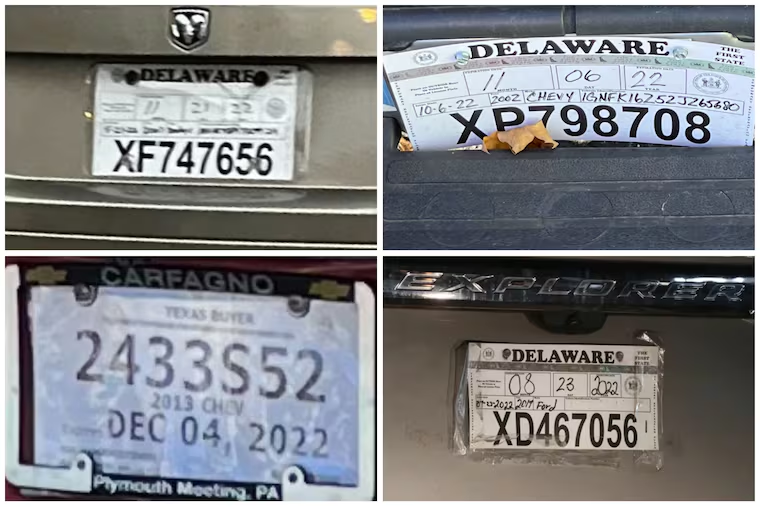The getaway car used in the shooting of 8 high school students had fake tags, a persistent problem for police
Fake paper tags have been used in other high-profile crimes, including a shooting outside of a Roxborough High School football scrimmage where 14-year-old Nicolas Elizalde was killed.

Hours after 30 shots were fired at eight high school students in the Burholme section of Northeast Philly Wednesday, Philadelphia police released footage of a blue Hyundai Sonata they said was the shooters’ getaway car.
The vehicle, Police Deputy Commissioner Frank Vanore said Thursday, had been stolen days earlier from a nearby block. What’s more, the car’s plates had been replaced with illegal paper tags, adding another wrinkle to the investigation.
» READ MORE: How rampant phony license plates are being used to get away with crimes in Philadelphia
“It makes it more difficult for us,” said Vanore. “We have to go back in time to look for the regular plate or see if we can see when it changed.”
Vanore said detectives responded to the report of a theft Saturday where they found a gray Kia Sportage parked in place of the Hyundai. Police believe the Kia, which was also reported stolen, was taken to Burholme and thieves subsequently fled in the blue car used in the shooting before ditching it.
The Hyundai was recovered on the 400 block of West Fern Street in Olney on Thursday. Police plan to collect whatever forensic evidence might be in that vehicle, as well as the Kia, which is also in their possession.
Fake paper tags have been used in other high-profile crimes, including a September 2022 shooting outside of a Roxborough High School football scrimmage where 14-year-old Nicolas Elizalde was killed.
What are paper plates?
The Pennsylvania Department of Transportation issues temporary tags when a driver buys a car from out of state. The agency has previously said these transactions are infrequent.
Other states, allow for more lax distribution of these paper tags.
Delaware car dealers, for example, have been able to print their own tags as a way to expedite sales since 2012. The pandemic led to thousands more of these legitimate tags flooding the roads as the Delaware Division of Motor Vehicles struggled to keep up with the demand for permanent license plates.
Still, that created an opportunity for people looking to avoid paying tolls or committing crimes.
A 2022 Inquirer report found fake tags for sale for as little as $80 on Facebook Marketplace.
» READ MORE: How rampant phony license plates are being used to get away with crimes in Philadelphia
Why are these tags an issue?
Law enforcement has previously said most people using fake tags are doing so in response to the proliferation of traffic cameras and in an effort to avoid red-light tickets and fines for other violations.
And that’s costing the city. Between August 2020 and June 2022, the Philadelphia Parking Authority said it lost out on $6 million in fines because of fake or unreadable tags.
Still, police have pointed to criminal cases, like the Five Points shooting, where suspects use the tags as a way to further hide their identity and avoid detection.
What’s the punishment?
In Pennsylvania, using a fake tag will usually result in a fine. Making and selling them is a misdemeanor. Even so, arrests for using, selling, or making these tags have been rare in recent years. Between 2017 and November 2022, the District Attorney’s Office reported 57 arrests on connection to phony plates. More recent numbers were not immediately available.
Can’t authorities single out the fake plates?
Experts have said the growing use of print-on-demand tags makes it so a decent forgery can avoid detection, especially if, say, it’s a Texas tag in Philly. A local officer may not be able to tell what’s off about the reproduction.
What’s more, as recently as last year, the police department was working with one automatic license reader and an NBC10 report found “no evidence of any arrests or vehicle recoveries happening as a result of the automatic license plate readers — even when more than one was functioning.”
Has anything changed?
Well, the city has funds for more license plate readers. According to the District Attorney’s Office, its Gun Violence Task Force secured a state grant that’s slated to help the police department buy 200 new readers. It was not immediately clear how many had been purchased.
Jane Roh, a spokesperson for the office, said information from license plate and tag images have been “critical in helping law enforcement to ID and prosecute shooters.”